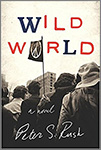Review — WILD WORLD by Peter Rush (Cameroon)
 Wild World
Wild World
(novel)
by Peter S. Rush (Cameroon 1972–73)
Prior Manor
August 2017
288 pages
$16.95 (paperback)
Reviewed by D.W. Jefferson (El Salvador 1974–76, and Costa Rica 1976–77)
•
You can’t change an institution unless you are willing to become a part of it and work from the inside. That’s what Steve Logan decided to do. In the spring of 1970 he is a senior at Brown University, very much in love with his girlfriend Roxy, a pre-med student, and planning to go to law school in the fall. Then he hears about Kent State, four student demonstrators killed by the National Guard.
Inspired by a campus appearance by a New York City police officer who is fighting corruption on the force, and unwilling to leave Roxy on her own as she has recently lost both her father and sister, Steve decides to join the local Providence police force and try to change the system from within.
As Steve begins active duty, he witnesses petty corruption such as cops being paid to look the other way, police brutality, and cops escalating the level of violence of an incident rather than just doing their job with the least amount of force required. Meanwhile Roxy and her fellow college students begin to view Steve as representing the enemy, with his uniform, his short hair and his gun.
Caught between two worlds, Steve must find a way to change the system and fight for the love of his life, while not compromising his principles.
Wild World is a crime novel, a love story and a mystery all rolled into one. Set in a college town in the early 1970s, it is well written and keeps your attention, though I would not classify it as a thriller. Author Peter Rush vividly recreates those times and faithfully captures the mood on campuses around the country during those tumultuous years of protest against the Vietnam War, and demonstrations involving social causes — international, national and local. For RPCVs, the book contains a couple references to the Peace Corps, which I’ll leave you to find for yourselves.
My one criticism of the book, specifically as a mystery, is that the author does not ever share with readers the details of the larger scale white-collar crime committed by police officials and others that Steve ultimately uncovers. I, for one, enjoy the “big reveal” scene of any mystery, so I was disappointed that it did not happen in the novel.
•
Reviewer D.W. Jefferson was a Peace Corps agriculture volunteer in El Salvador (1974-6) and Costa Rica (1976-7). A blog about his Peace Corps years is at:dwjefferson.blogspot.com He is currently retired from a career in computer software engineering.
No comments yet.
Add your comment